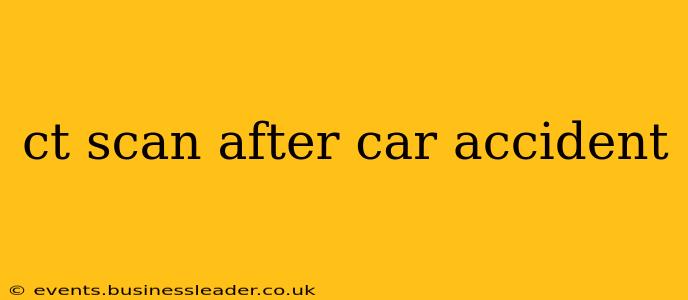A car accident can leave you shaken and injured, and determining the extent of those injuries is crucial. A Computed Tomography (CT) scan is a powerful diagnostic tool often used after a car accident to visualize internal injuries that might not be immediately apparent. This comprehensive guide will explore when a CT scan is necessary after a car accident, what to expect during the procedure, and what the results might mean.
When Is a CT Scan Necessary After a Car Accident?
The decision to order a CT scan after a car accident rests with the attending physician or emergency medical professional. Several factors contribute to this decision, including the severity of the accident, the presence of specific symptoms, and the patient's medical history.
Severity of the Accident: High-Impact Collisions
High-impact collisions, rollovers, or accidents involving significant vehicle damage significantly increase the risk of serious internal injuries. In such cases, a CT scan is often ordered as a precautionary measure to detect potential fractures, internal bleeding, or organ damage.
Symptoms Indicating the Need for a CT Scan
Certain symptoms strongly suggest the need for a CT scan. These include:
- Headache: Severe, persistent headaches, especially accompanied by dizziness, nausea, or vomiting, warrant immediate medical attention and often a CT scan to rule out brain injuries like concussions or intracranial bleeding.
- Neck Pain: Intense neck pain, especially with limited range of motion, could indicate cervical spine injuries requiring a CT scan for detailed evaluation.
- Chest Pain: Chest pain following a car accident could signal rib fractures, lung contusions, or even cardiac damage, making a CT scan essential.
- Abdominal Pain: Abdominal pain could indicate internal organ damage, such as spleen or liver lacerations, requiring immediate medical attention and often a CT scan.
- Loss of Consciousness: Even brief loss of consciousness after a car accident necessitates a CT scan to rule out serious head injuries.
- Altered Mental Status: Changes in mental clarity, confusion, or disorientation should prompt a CT scan to identify potential brain injuries.
Medical History: Pre-existing Conditions
Individuals with pre-existing medical conditions, such as osteoporosis or a history of previous spinal injuries, might be at greater risk of serious complications following a car accident and may benefit from a CT scan.
What to Expect During a CT Scan
A CT scan is a relatively quick and painless procedure. You'll be asked to lie on a table that slides into a large, donut-shaped machine. The machine rotates around you, taking a series of X-ray images. You might be asked to hold your breath for short periods during the scan. The entire procedure usually takes only a few minutes. While there's no pain associated with the scan itself, you might experience some discomfort from pre-existing injuries.
What Do CT Scan Results Show?
CT scan results provide detailed images of the internal structures of your body. A radiologist will interpret the images and provide a report to your physician. The report might reveal:
- Fractures: Bone fractures in the skull, spine, ribs, or other bones.
- Internal Bleeding: Bleeding within the brain, abdomen, or chest.
- Organ Damage: Damage to internal organs, such as the liver, spleen, lungs, or kidneys.
- Soft Tissue Injuries: Injuries to muscles, ligaments, and tendons.
What if the CT Scan Shows No Injuries?
Even if a CT scan reveals no immediately apparent injuries, it doesn't entirely rule out the possibility of future complications. Some injuries, such as whiplash or concussions, might not show up on a CT scan but can still cause significant pain and discomfort. It's crucial to follow up with your doctor and report any persistent symptoms.
Are there Alternatives to a CT Scan?
In some cases, other imaging techniques, such as X-rays or MRI scans, may be used instead of or in addition to a CT scan, depending on the suspected injury and the physician's assessment.
Can I Refuse a CT Scan?
You always have the right to refuse medical treatment, including a CT scan. However, refusing a recommended CT scan after a significant car accident could mean missing the opportunity to diagnose and treat serious injuries promptly. It's vital to discuss any concerns or hesitations with your physician to make an informed decision.
This information is for general knowledge and shouldn't be considered medical advice. Always consult with a healthcare professional for any health concerns or before making any decisions related to your health or treatment.
